Archived Fire Damage Blog Posts
Tips to Stay Safe during Fire Damage: SERVPRO of Cherokee County
3/29/2022 (Permalink)
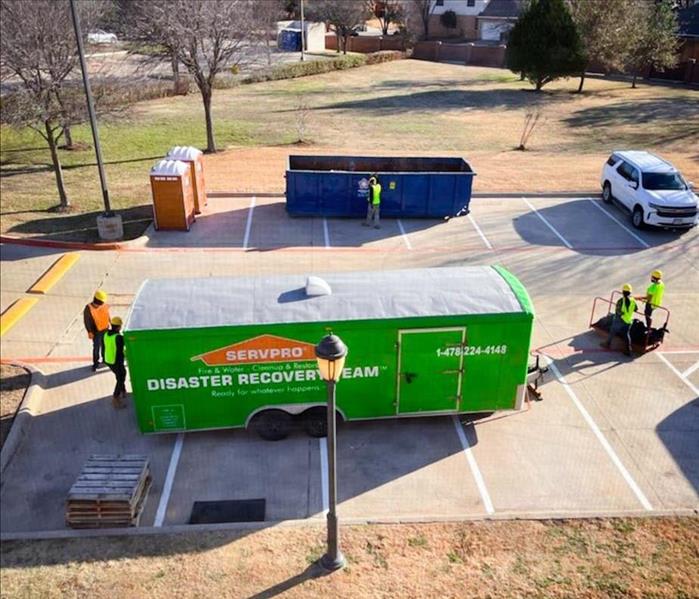 No matter how serious your property damage may be, SERVPRO of Cherokee County is your local expert for restoring your home or business.
No matter how serious your property damage may be, SERVPRO of Cherokee County is your local expert for restoring your home or business.
It's that time of year again - fire season in Cherokee County, GA, and surrounding areas. Between February and May, the weather gets hotter and drier, while the risk of house fires rises. A fire may start from a variety of sources, ranging from a faulty wire to an overloaded outlet to a kitchen mishap to a bonfire left unattended. It's critical to know how to react quickly and effectively if your home catches fire.
Here's What You Need To Know If A Fire Starts:
The first line of defense against a house fire is to know how to use the proper fire extinguisher for the situation. This simple procedure can help save lives and hundreds of thousands of dollars in property damage. If the fire spreads uncontrollably, evacuate immediately and stay away, then call 9-1-1. Leave all of your belongings where they are and save yourself and your loved ones.
If your clothing ignites, remember the old adage: Stop, Drop, and Roll.
It's critical to utilize the stairs if you live in a building with elevators in case of a fire. The elevator electrical system may be damaged by a fire, causing the shaft to operate like a chimney and rapidly fill up with deadly fumes.
Doors may be used to your advantage in a fire, potentially saving your life. If the doorknob or handle is hot, don't open it. If you can't exit through the primary route, look for another option. Do not open any doors that are warm to the touch.
Close any doors that might obstruct your exits, lay a wet towel beneath the doors, and call the fire department or 9-1-1 if flames, heat, or fire block your avenues of escape. Tell them exactly where you are so they can find you.
If you're near a window that you can't use as an escape, open it and wave a brightly colored cloth or use your phone flashlight to signal for help.
What To Do After a Fire
After a fire, it is important to contact a professional fire damage restoration company like SERVPRO of Cherokee County. We have the training, experience, and equipment to properly restore your home - "Like it never even happened."
If you try to clean up the fire damage yourself, you could end up making the situation worse both in your home and with your insurance company's process.
Trust the experts, and call today!
Clothes Dryer Safety Tips to Prevent Fires
2/14/2022 (Permalink)
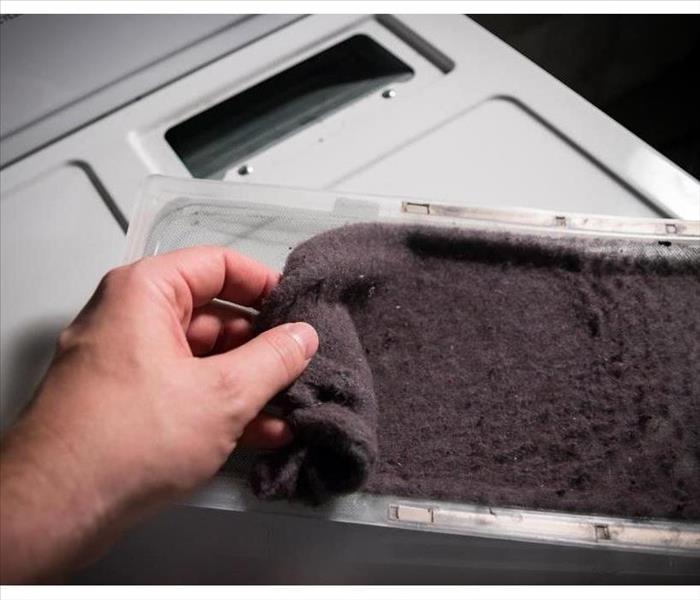 The lint trap should be cleaned between all loads of laundry.
The lint trap should be cleaned between all loads of laundry.
Keep Your Home Safe From a Dryer Fire
Clothes dryers are involved in thousands of house fires each year, and the highest number of these occurs in fall and winter. The majority of these fires start because the dryer is not cleaned and maintained properly. Luckily, there are some simple tips available to help keep your home in Woodstock, GA, safe from a dryer fire.
1. Installation
Using the correct electrical outlet and plug to hook up your dryer is essential. To ensure that installation is completed properly and safely, consider calling a professional to connect your dryer. Like all electrical appliances, dryers come with warnings and instructions from the manufacturers, and you should read over these carefully.
2. Cleaning
The lint trap should be cleaned between all loads of laundry. The back of the dryer should also be cleared, as lint can build up in this area. Every few months, the vent pipe or exhaust should be emptied using a plumber’s snake in order to avoid a lint fire.
3. Proper Use
Using your dryer properly can also protect your home from a dryer fire. Avoid overloading your dryer with too much clothing at once. Do not dry items with rubber, foam or plastic, such as bathroom mats with rubber backing. Never place clothing with oil, gas, alcohol or any other flammable chemical in your dryer. Always turn the dryer off before going to bed or leaving your residence.
4. Maintenance
Routinely inspect equipment parts, such as the venting system, to ensure that there is no damage or build-up of lint. Keep the area around the dryer clean and free of anything flammable. Check outside venting for blockages, such as birds nests. Unplug or disconnect the dryer if you will be away for an extended period.
A dryer or lint fire is almost completely preventable, but homeowners must take proper precautions. If your residence has been damaged in a dryer fire, don’t hesitate to reach out to a fire restoration service today.
The Riddle of Water Damage After a Fire
1/21/2022 (Permalink)
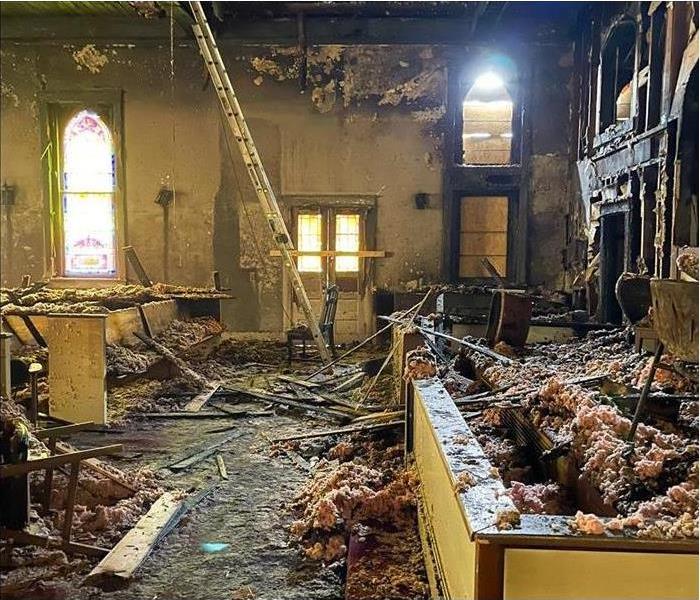 Fire and water damage to a building in Nelson, GA.
Fire and water damage to a building in Nelson, GA.
The Aftermath Of a Fire
The flames billow during a fire in Nelson, GA, and nothing is more welcome than the fire fighting crew with the pressurized water hoses and chemical retardants being sprayed onto the roof of your commercial building. As the flames die down, an inspector can then inform you the building is safe to reenter. That is when you notice the fire damage and water - so much water. How can you begin to deal with all that unexpected water? Try these three steps.
1. Contact a Professional
Fire and smoke restoration professionals can quickly begin work on removing the water from your building once the fire marshal, inspector or deputy allow entrance. By beginning the cleanup process as quickly as possible, future mold and mildew problems can often be alleviated.
2. Look for Water
An average fire hose can supply up to 24 gallons of water a minute when fighting a fire. That means that in 30 minutes, the hose is shooting out enough water to fill an average swimming pool with about 18 inches of water. Along with fire damage, water pressure often breaks windows, tears through doors, and enters ceiling holes. Water may find its way into unexpected places such as inside electronics, under wooden floors, and inside walls. Looking for water damage in hidden places can save time and money.
3. Create Air Flow
After removing as many of the porous items from the water as possible, and once the professional team has removed the majority of the liquid, create a method of air circulation and ventilation. Your fire restoration team may offer industrial blowers, dehumidifiers and air moving fans, but if they do not, it is still important to get the air moving to remove excess moisture from the building. This can help prevent mold and mildew, warping floors, and bulging walls.
Fire damage often includes hundreds of gallons of water. Knowing what the possible scenario is in the aftermath of a fire can help you be prepared for the unexpected. Too much water can be a bad thing, especially when it is on the floor of your commercial property.
How Many Fire Alarms Do I Need in My Home?
12/6/2021 (Permalink)
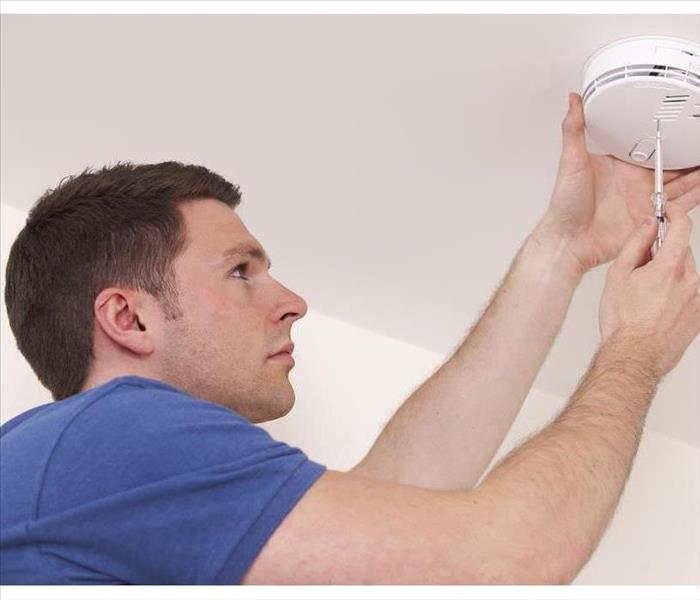 A fire alarm is an essential safety device in your home.
A fire alarm is an essential safety device in your home.
How Many Fire Alarms Should I Install in My Home?
The quantity depends on the size and layout of your home. You can ask your friends and neighbors for an opinion, but the answers will all be different; however, the National Fire Protective Association recommends fire alarm placement:
- In every bedroom
- Outside the sleeping areas on all bedroom levels
- On all levels of the home including the basement
- At the bottom of stairways, including the basement stairs
What Type of Smoke Alarm Do I Need?
Ionization smoke alarms are best at detecting hot, fast-moving fires. Photoelectric smoke alarms are best at detecting slow-burning smoky fires. If both are available, get some of each and take advantage of both technologies. If a fire alarm with both sensors is available in Holly Springs, GA, install those throughout your home.
Should My Smoke Detectors Be Connected?
Connecting smoke detectors is always a good idea. If there is a fire in your home, you want to know about it right away. Early notification of a fire minimizes fire and smoke damage. You don’t want to wait until a closer detector senses the problem and sounds an alarm.
How Long Does a Smoke Alarm Last?
Every smoke alarm has the manufacture date stamped on the back. When ten years from that date has passed, you should replace that unit. If the manufacturer suggests a shorter replacement interval, follow those instructions.
When Should I Replace the Batteries?
It’s always good to replace batteries on a regular schedule. However, if you are the type of person that only responds to the low-battery beep, change them all immediately.
A fire alarm is an essential safety device in your home. It has a long service life, requires little attention and saves lives. It can keep your family safe and minimize fire damage in your home. Take comfort in the fact that, if you do have a fire, there are fire remediation experts in your area. They have been trained to bring your lives and your home back to normal quickly.
How To Avoid a Fire During a Natural Gas Leak
11/10/2021 (Permalink)
 It is not easy to a void a gas leak.
It is not easy to a void a gas leak.
Five Tips If You Are Dealing With a Gas Leak
If you smell gas in your Holly Springs, GA, home, it could be a sign that there is a leak. This type of leak could put you at risk for a gas fire. Avoiding a fire may be difficult, but it can be done. Consider these five tips if you ever have to deal with gas leakage, but remember that it may be safer for you to simply evacuate your house and call emergency responders.
1. Avoid creating a spark. When natural gas fills your home, the smallest spark could start an explosion. You can avoid causing sparks by not turning lights on, using candles or making calls on a cellphone.
2. Start airing out the space. If the gas is not allowed to build up in your home, you may lower your risk of a gas explosion. Opening doors and windows increase the ventilation and helps the gas dissipate.
3. Check obvious sources. If you have time, you can check some obvious sources of natural gas leakage. This usually includes appliances that run on gas. Stoves are the most common culprit as it is easy for someone to bump a burner on accident.
4. Turn off the gas. When you hear a hissing sound or smell rotten eggs, you can turn off your home's gas. The valve is usually located by the meter.
5. Know the signs of a leak. Before a gas fire can happen, there usually has to be a leak. You can avoid the fire if you can put a stop to the leak quickly. Common signs of a leak include hissing air, blowing dirt, rotten egg smell and bubbling puddles.
It may not always be possible for you to avoid a gas fire. When the unexpected happens, you need to know who to call for help. A residential fire cleanup crew can help you get your life back to normal.
How Smart Is Buying a Smart Smoke Detector?
7/23/2021 (Permalink)
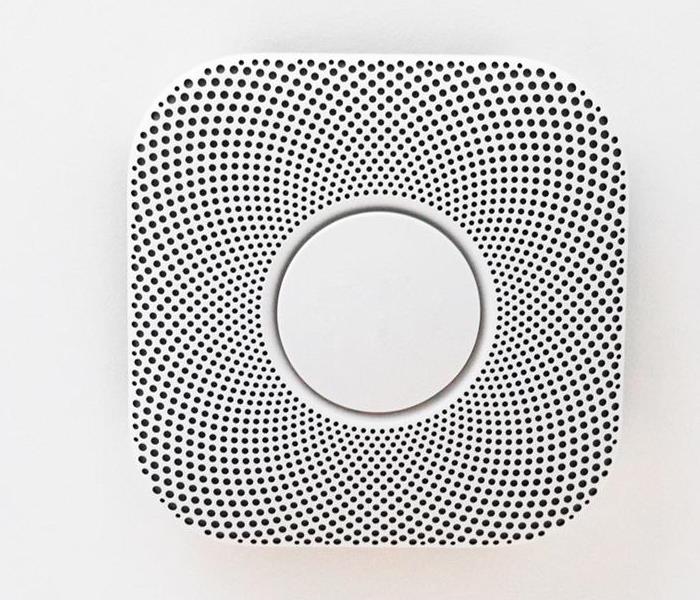 Fire safety is greatly improved with the smart smoke alarm technology offered nowadays.
Fire safety is greatly improved with the smart smoke alarm technology offered nowadays.
Buying A Smart Smoke Detector: How Smart Is It?
If you’re looking to modernize your Free Home,GA home, you’ve probably heard of a smart smoke alarm. Compared to a traditional smoke detector, a connected one offers benefits allowed by modern technology. Understanding what makes them “smart” will allow you to make an informed decision if it’s worth buying one yourself.
Features of a Smart Alarm
There is no single model of smart smoke detector. It is worth shopping around to find a model that has all you want. They offer an assortment of convenience and advanced monitoring depending on the year and model:
- Pinging connected devices if smoke or carbon monoxide is detected
- Advanced technologies for faster smoke detection and self-testing
- No alarm beeping when the battery is low in favor of an app notification
- Voice-activated personal assistant integration around your home with Amazon Alexa, Google Assistant or Apple HomeKit for convenience and functionality when there is no danger
Stop a Fire Yourself Even When Not Home
The top benefit of a smart smoke alarm is the ability to act yourself even while away from home. A neighbor may call emergency services for you, but the problem has already flared out of control when it becomes noticeable to other households.
With the modern sensors and an immediate application alert, you will know exactly where the fire is so you can make the call to deploy fire services if the fire is major. You can also deploy nearby neighbors or relatives to extinguish minor fires before they become unmanageable no matter how far away you are.
Fight Fire Using Your Fingertips
By connecting a smart alarm, your phone can become a command center for your entire home. Unfortunately, a fire still damages your home even if caught earlier. Using its most basic feature, your phone can call a local fire restoration company to clean up and repair any damage.
Digitally monitoring your home is a benefit of the digital age. Fire safety is greatly improved with the smart smoke alarm technology offered nowadays.
What To Avoid When Putting Out a Grease Fire and How To Contain It
6/24/2021 (Permalink)
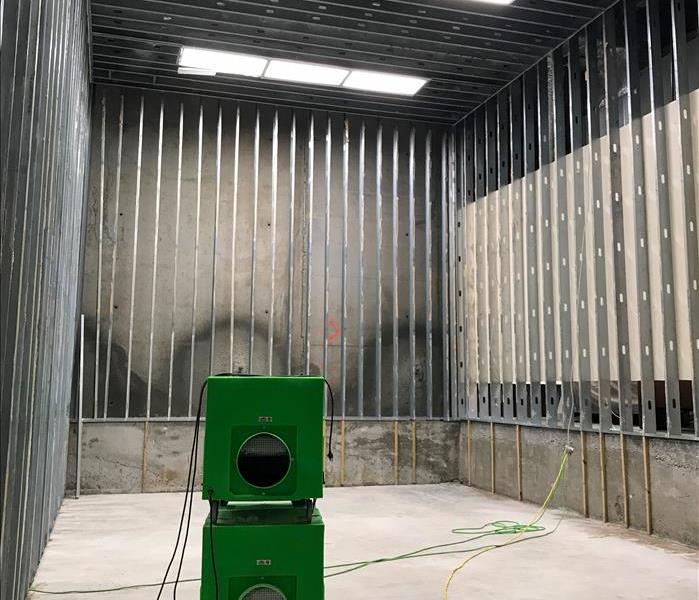 Let us help with the fire damage restoration.
Let us help with the fire damage restoration.
How To Put Grease Fire Out
Grease fires are dangerous and can quickly grow out of control. When cooking oil gets too hot, it starts to smoke and can easily catch fire. In the event a grease fire happens, knowing what to do and what to avoid can not only minimize the cost of fire cleanup in Free Home, GA but it can also save lives.
Use a Lid or Pan to Smother the Flame
Fires are fed by oxygen. To extinguish a grease fire:
- Quickly cover the fire with a lid or pan so that you can cut off the fuel source and smother the flame.
- Be sure to turn off the heat immediately.
- Don’t remove the lid until the pan is completely cool. If you take off the lid too soon, the fresh air can reignite the hot flames.
If this doesn’t work, consider using baking soda or salt to quench the flames.
Never Pour Water on a Grease Fire
One of the worst things you can do to a grease fire is to add water. Oil and water don’t mix, so the water evaporates on the hot stove, creating a sudden burst of hot steam that spreads the fire. The more water used, the bigger the blast of fire. This can cause the fire to swell out of control.
Don’t Move the Flame
If you are worried about the flame, you might decide to move the fire outside. However, there are many dangers when moving a grease fire. The risk of dropping the hot pan could spread the fire into other parts of your home. Also, movement creates more oxygen, which can feed the flame and cause it to become bigger. It’s best to contain the flames on the stove.
Grease fires can be handled right if you make smart decisions in the few seconds you have when the fire erupts. If the fire gets out of hand, evacuate immediately and call 911 for help.
How To Stop a Fire Alarm From Beeping
3/30/2021 (Permalink)
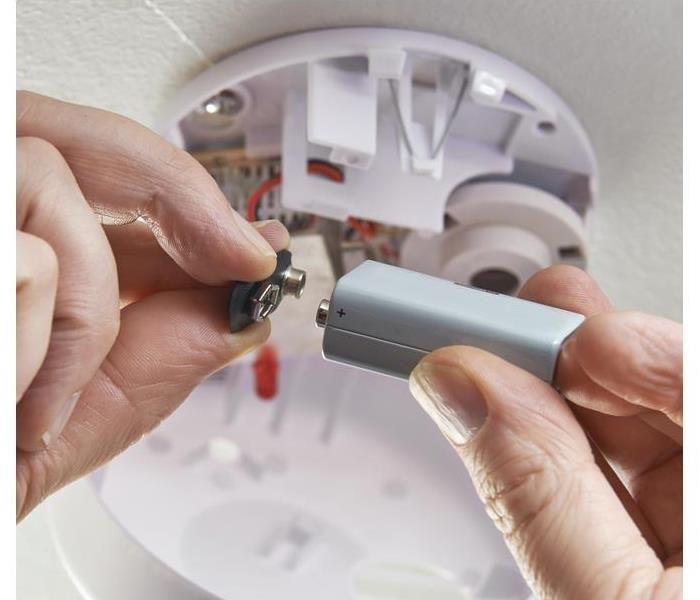 Change the batteries of your smoke alarm every six months.
Change the batteries of your smoke alarm every six months.
Conduct Routine Maintenance In Your Fire Alarm
It’s critical for your fire alarm to work when you need it. If the beeping sound goes off in the middle of the night for no foreseeable reason, however, it can be irritating and jarring. Let’s examine a few causes and remedies for the unpleasant noise.
1. Replace the Batteries
One of the most common reasons for a continuous beeping is a battery that is losing its power. It is recommended that the batteries be changed in each alarm every six months. Make sure you switch out the old batteries with properly-placed new batteries so that you know the device is working.
2. Clean the Alarms
Dust can settle into the crevices of your alarm and cause it to malfunction. If it beeps continuously, open the fire alarm and gently blow out the dirt with a small air blower. Since lodged dirt can also make the device stop working altogether, get in the habit of checking it for dirt and dust every few weeks. One of the last things you want to deal with is smoke damage in your Canton, GA, home, so it’s important to stay vigilant.
3. Reset the Device
Resetting the alarm will sometimes stop it from beeping. At the circuit breaker, turn off the power to the alarm. Carefully remove the device from the wall mount. After unplugging the power supply and removing the battery, hold the test button down for about 20 seconds. Replace the battery and plug the power supply back in. Once you have restored the power at the circuit breaker, reattach the alarm to the wall mount.
If your alarm malfunctions during a fire, the resulting fire damage should be addressed quickly. Water and smoke can cause severe damage, so call a fire restoration service right away to inspect your home.
Make sure to conduct routine maintenance on your fire alarm, and it should serve you well for several years.
3 Steps To Take If You Smell Natural Gas
2/2/2021 (Permalink)
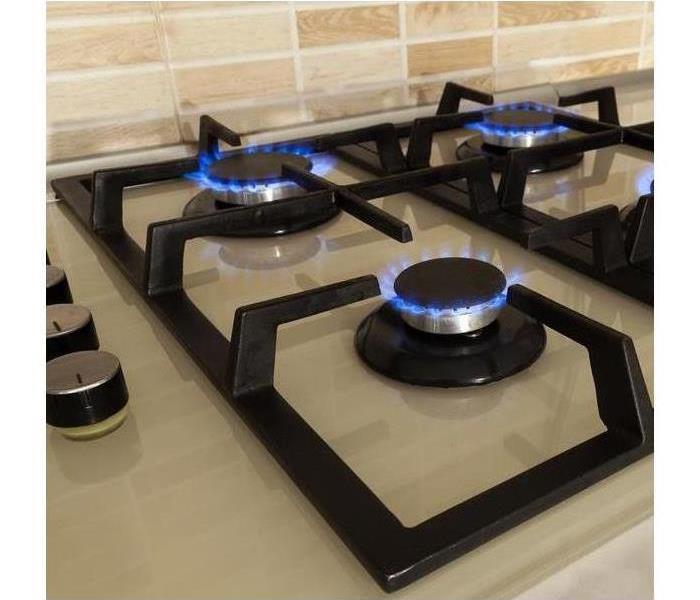 A gas leak can introduce a large quantity of flammable gas into a residence in a matter of minutes
A gas leak can introduce a large quantity of flammable gas into a residence in a matter of minutes
3 Steps to Manage a Gas Leak
A natural gas leak can introduce a large quantity of flammable gas into a residence in a matter of minutes. Homeowners can take three steps to manage or resolve this problem. If a gas leak is ongoing, a homeowner may prevent a gas fire by shutting off the main valve and contacting the gas company or 911 from a safe distance.
1. Don't Turn On Lights or Electrical Appliances
Electric lighting or appliances may generate sparks that can cause a gas explosion. If a homeowner or other residents are searching for the source of a gas leak, battery-operated flashlights are safe to use.
2. Find the Source or Shut Off the Gas
The burners on a gas stove and oven can be accidentally turned on and cause natural gas to build up in a home without a leak. Homeowners may also want to check the condition of gas lines and connections leading to other appliances. If a leak is present or the source of the gas is not evident, a homeowner may reduce the risk of a gas fire by turning off the valve on the gas meter.
3. Ventilate and Evacuate
Ventilation is necessary whether the underlying issue has been solved or the gas has temporarily been shut off. A high concentration of gas can endanger utility workers and appliance repair specialists as well as residents. In the meantime, every occupant of a residence should evacuate.
Once a homeowner evacuates, he or she should assess the situation. If a leak is present from any source, it is advisable to contact the gas company in Woodstock, GA. This may also be an appropriate scenario in which to call 911, particularly if the risk of a gas fire or explosion is high. If a fire or explosion occurs, a homeowner should also contact an insurance company and a mitigation and restoration service.
How To Prepare Kids for a Fire Emergency
12/8/2020 (Permalink)
 Kids' safety is an integral part of any fire escape plan
Kids' safety is an integral part of any fire escape plan
How To Prepare Kids for a Fire Emergency
As a parent, you work hard to keep your kids safe. When was the last time you performed a drill or went over an escape route? Every kid's safety plan should include well-planned and practiced fire emergency steps.
Create a Plan
Develop fire escape plans as a family. Find all of the possible exits and mark them on a map of your home. Create routes from each bedroom so that each child has his or her own escape plan. Decide on a meeting place outside of the house as a family. Allowing kids to help with the planning helps them learn and memorize what to do if there is a home fire.
Practice
Performing fire drills at least twice a year will keep your family up to date on kids safety. When practicing, treat the drill as though it were real. Set off smoke alarms and have your children use the following fire safety tactics:
- Roll out of the bed and flat on their stomachs onto the floor
- Crawl on their forearms and knees to the nearest exit
- Check doors with the back of their hands to see if they are hot before opening them
- Close doors behind them to prevent spread and fire damage
With practice, children can use these methods to avoid as much fire and smoke exposure as possible in a real emergency.
Prep Your Home
Preparing your kids means preparing your home, too. Install smoke alarms in every bedroom and outside of all sleeping areas. Change the batteries every six months. Periodically check that windows are easy to open and that exit doors are easy to access. Finally, keep a list of emergency numbers, including the local fire department in Woodstock, GA, and memorize them with your kids.
Kids' safety is an integral part of any fire escape plan. With proper planning and practice, your family can rest easier knowing that you are all prepared.
How To Check Your Sprinkler System
11/11/2020 (Permalink)
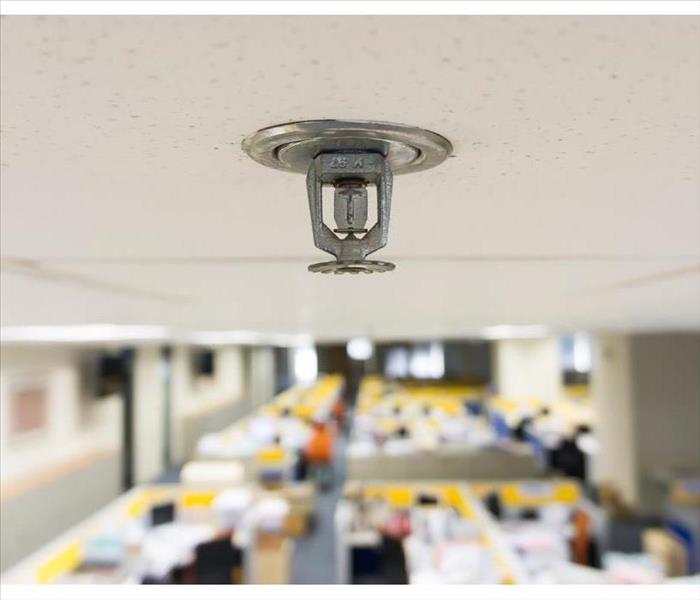 Maintaining a working fire sprinkler is requisite for any business
Maintaining a working fire sprinkler is requisite for any business
How To Check Your Sprinkler System
Fire sprinkler systems are critical to keeping your employees safe and slowing destruction from out-of-control blazes. Before an inferno takes hold in your office, check that everything is functioning properly through the use of a water pressure gauge.
Sprinkler System Failures
Your fire suppression system may be faulty for any number of reasons, including:
- Improper valve installation
- Extensive building construction
- Alterations to the water distribution system
- Component damage
Whatever the cause for improper operation, lacking adequate water protection with your building afire is a nightmare scenario nobody should endure. An easy fire sprinkler cleanup in Waleska, GA, remains far preferable to needing a commercial fire and smoke restoration service to rehabilitate extensive destruction.
Sprinkler System Gauge Selection
There are two types of gauges with which you can test your fire sprinkler. Dry gauges are the most common and employ a spring-loaded mechanism to operate. Liquid gauges incorporate glycerin to deliver measurements that are more precise.
Older gauges occasionally contain flaws such as fluttering pointers or leaks. Ones suffering from these or any other imperfections must be discarded and new ones purchased. Check that whichever version you choose has Underwriters Laboratory and Factory Mutual approvals, both of which are required by the National Fire Protection Association. These quality seals provide assurance that yours will deliver accurate readouts.
Manufacturers commonly bundle the necessary plug, nipple and 3-way valve along with these devices. If yours lacks the required installation components, consult a professional to be sure you are acquiring ones that reflect the correct measurements. Once in place, the 3.5-inch dial measures both water and air pressure. Research your manual to determine the optimum gauge numbers. If yours falls outside of the acceptable range, promptly hire a repair specialist.
Maintaining a working fire sprinkler is requisite for any business. See that yours is operating properly by selecting and attaching the best gauge for your network and then viewing it regularly.
Are Your Kids Fire-Safety Savvy?
9/18/2020 (Permalink)
 How can you teach your kids about fire safety?
How can you teach your kids about fire safety?
Teaching Your Kids About Fire Safety
No one in Woodstock, GA, likes to talk about the threat of a home fire. However, when it comes to kids safety, talking about a potential emergency teaches children what to do should they actually face a fire crisis. Just like school fire drills, home fire drills give everyone a chance to practice getting out of the house quickly and safely. Family discussions about fire safety help children feel less anxious because they are more prepared. How can you teach your kids about fire safety? Here are a few ideas:
Practice Makes Perfect
Prepare an escape map showing home exits and how to get to them from each child's room.
- Conduct regular fire drills to practice fire escape routes.
- Occasionally challenge kids by pretending certain exits are blocked by smoke or fire.
- Include windows as possible exits. Teach kids how to unlock and open them, and remove the screen.
- If available, show children how to use upper floor rescue ladders.
- Time drills to see if your family can get out of the house and meet at a designated place within 3 minutes.
- Ensure children understand that, once out of a burning building, they must never go back for anything--not even a pet.
What If You Can't Get Out?
Review what to do if escape routes are blocked.
Call 911 or yell from a fully opened window. Stand in front of it and cover your mouth with a (preferably) wet towel or clothing.
Block cracks around doors with sheets or blankets.
Don't hide in a closet or under a bed because firefighters will be looking to get you to safety.
"Stop, drop and roll" if clothing catches fire.
Preparation and practice can save lives and prevent expensive property damage, in addition to other fire restoration expenses. Kids safety depends on their knowledge and know-how. Protect your children by making sure they are fire-safety savvy.
When Water Damages Join Fire Damages
7/9/2020 (Permalink)
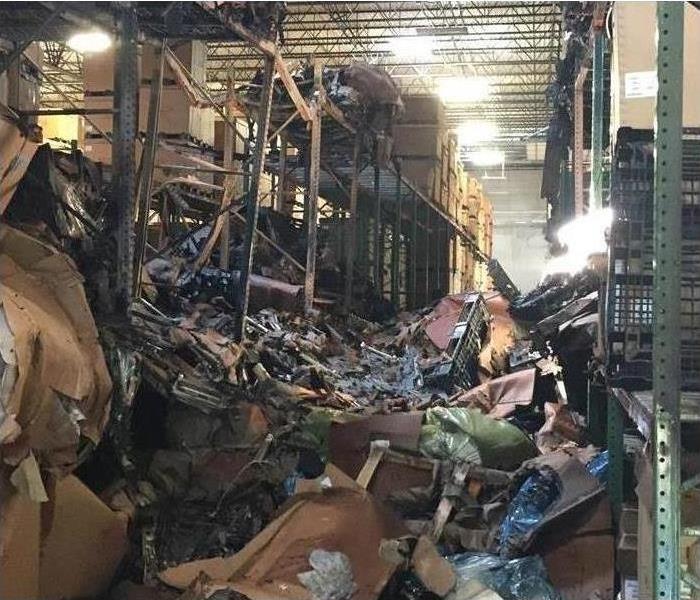 Fire damage in a Waleska, GA
Fire damage in a Waleska, GA
In their efforts to extinguish the fires that threaten commercial properties, firefighters use a lot of water. The powerful water pressure used to put out flames sends moisture into all corners of the building. This quick and decisive response to fire and smoke is often responsible for saving Waleska, GA, businesses, and the contents of commercial buildings. However, it can also add water damage to the fire damage that has already occurred.
Schedule Cleanup and Reconstruction Services
Once the smoke clears and it's safe for you to enter your business, one of your first steps should be to contact fire and water damage restoration professionals. These experts will work through several tasks to make your building look as if the fire had never happened:
- Emergency inspection
- Fire and water damage assessment
- Board-up and roof tarp services as needed
- Water removal and drying
- Removal of smoke or soot stains
- Fire damage cleaning and repair
- Restoration services
Remember that these professionals have received specialized training and have access to other tools to improve the cleaning and restoration processes.
How To Respond While Waiting for Cleanup Crews
It is best to hire professionals for the actual cleanup and repair work necessary after firefighting efforts are complete. However, there are several things you can do to protect your commercial property:
- Contact your insurance company.
- Take pictures of the damage for your records.
- Prevent people from moving through the affected areas.
- Place clean tarps or towels over high traffic areas.
- Turn the water and electricity off to maintain safety in the rest of the building.
- Remove indoor plants and carefully wash off both sides of the leaves.
- Change all HVAC filters.
- Don't try to clean any electrical appliances.
Resist the urge to wipe down surfaces or furnishings. This could lead to the spread of soot contamination or cause further damage to your property. Wait for professionals to arrive.
When firefighters pull out their powerful fire hose, water damage is sure to join the fire damage caused by the flames and smoke at your commercial property. You may have to accept some additional damages, but with the help of professionals, you can expect your property to look as good as it ever did when the dust has finally settled.
 No matter how serious your property damage may be, SERVPRO of Cherokee County is your local expert for restoring your home or business.
No matter how serious your property damage may be, SERVPRO of Cherokee County is your local expert for restoring your home or business.




 24/7 Emergency Service
24/7 Emergency Service











